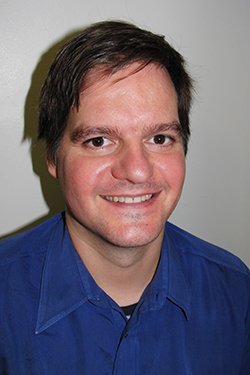Andreas Keller
2008 Regional Award Finalist — Post-Doc

Current Position:
Research Associate, Laboratory of Neurogenetics and Behavior
Institution:
Rockefeller University
Discipline:
Neuroscience

Current Position:
Research Associate, Laboratory of Neurogenetics and Behavior
Institution:
Rockefeller University
Discipline:
Neuroscience
Recognized for: Developing a novel approach that allows for a computerized high throughput testing of olfactory sensitivity, leading to the initiation of the Rockefeller University Smell Study
Areas of research interest and expertise: Olfaction; neuroscience; genetic variability; consciousness
Biography
PhD, Genetics, Julius-Maximilian-University in Wuerzburg, Germany
BA, Biology and Virology, Friedrich-Alexander-Universitaet, Erlangen, Germany
Odors are perceived through odorant receptor proteins that are located in the membrane of olfactory sensory neurons in the nose. There is unparalleled genetic and functional variability in odorant receptor genes in the human population. As a consequence, we all smell the world with different sets of receptors.
It has long been speculated that these differences in the genetic setup of the olfactory system influence how a given odor smells to an individual. However, this hypothesis was difficult to test until Andreas Keller and Leslie Vosshall initiated the Rockefeller University Smell Study in 2004. Their approach was novel in that it allowed for a computerized high throughput testing of olfactory sensitivity. The unparalleled amount of data about human odor perception that could not have been collected by traditional psychophysical methods was complemented in an interdisciplinary effort with population genetics and cell biology to show, for the first time, a connection between an odorant receptor gene and odor perception.
After receiving the Blavatnik Award, Dr. Keller continued pursuing his ambitious goal of understanding how the human sense of smell works. His research since then has become more trans disciplinary. In addition to his original training as a geneticist, Andreas started to integrate the viewpoints of psychology, philosophy, and psychiatry. Today, Dr. Keller considers the chemical properties of odor molecules and the central processes involved in the processing of odor information. He believes that using this integrative approach will lead to a more complete and satisfying answer.
“Due to the large genetic variability in odorant receptor genes, each individual perceives odors differently. The long term goal of my research is to understand olfactory perception, as a model system of all conscious perception, through the perceptual differences between genetically different individuals.”
Key Publications:
Other Honors:
2009 Young Investigator Award by NARSAD
In the Media:
Human nose can detect 1 trillion odours. Nature. 20 March 2014
Sniff study suggests humans can distinguish more than 1 trillion scents. The Rockefeller University Science News. March 20, 2014
Andreas Keller: The Variability of Odor Perception. GET Conference 2013.